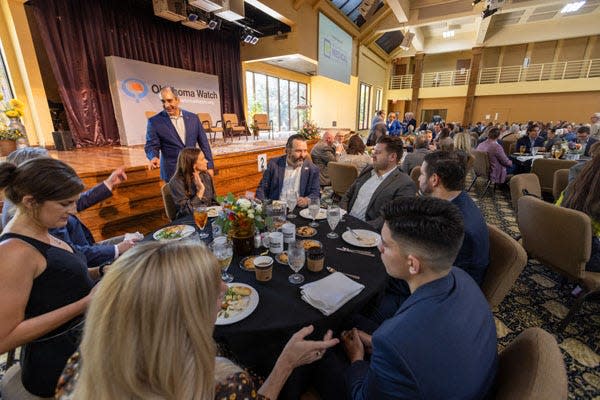Four former Oklahoma governors urge Gov. Kevin Stitt to cooperate with state tribes
- Oops!Something went wrong.Please try again later.
- Oops!Something went wrong.Please try again later.
- Oops!Something went wrong.Please try again later.
- Oops!Something went wrong.Please try again later.

Four of Oklahoma’s former governors — two Democrats and two Republicans — spoke about the highs and lows of their terms in office and emphasized Thursday the need for a strong and close relationship between the state and its Native tribes.
David Walters, Frank Keating, Brad Henry and Mary Fallin-Christensen, who cumulatively held the governor's post from the 1990s until the election of current Gov. Kevin Stitt, spent the better part of Thursday afternoon talking about public service, debates with the legislature and the importance of education. Their talk was a fund-raising event for Oklahoma Watch, the nonprofit investigative journalism group.
But while the event was part history lesson and part impromptu reunion, the four governors also had a coded message for Stitt: listen to tribal leaders and forge strong working relationships with Oklahoma’s 39 tribal nations.
More: The controversy behind 2 tribal gaming compacts being considered by Oklahoma lawmakers
Brad Henry, a Democrat who served as governor from 2003 until 2011, said state leaders have to do a better job of recognizing and understanding how important tribal nations are to the state.
“Sometimes we forget about all the dollars they (tribal nations) bring back to our state,” Henry said. “They do incredible things. You know, we’ve had some great, great energy corporations in Oklahoma that have left our state, that have picked up their headquarters and moved to Houston. We don’t have to worry about that with the tribes. Their headquarters are not going anywhere. Oklahoma is their home.”
State leaders, Henry said, have to do a better job of reaching out and including the tribes as true partners. “They all want to work with the state. They want good things for the state,” he said. “We have to remember what’s good for the tribes is good for the state of Oklahoma.”
Fallin, a Republican and the first woman to serve as governor, said she agreed with Henry. “I think what’s lacking today is respect,” she said. “Mutual respect. Collaboration. Talking. Listening. Inviting people more to the table.”
Fallin said when she was governor she regularly hosted policy luncheons with tribal leaders at the governor’s mansion. “I asked every one of them what their issue would be and what they’d like to tell the governor. Just sit and listen and try to have open dialogue. Agree when you can. Disagree with you must, but have that relationship. It would be important to have it restored.”
Walters, a Democrat who served as governor from 1991 to 1995, said the common element in tribal relationships was just listening. He said his administration was the first to sign compacts with tribal nations.
“It’s a matter of respect,” Walters said. “Any one of us could have shown respect and asked for 5 or 10 % more on those compacts and it would have been done. Instead, there are lawsuits filed. There’s all kinds of upset. That is a terribly unfortunate thing for a group that contributes billions to our economy and is always attempting to do the right thing. It’s pretty simple.”
Frank Keating, a Republican who was governor from 1995 through 2003, agreed with the other governors. He said his administration worked with tribal leaders on compacts and tourism. “In the state of Oklahoma, the tribal community has the same per capita personal income, education and health care outcomes as the white population,” he said. “And I think that’s an example of brotherhood and sisterhood.”
While the governors talked extensively about their tenure, Thursday’s event also featured a fifth governor ― George Nigh, a Democrat who served as governor for nine days in 1963 when then-Gov. J. Howard Edmondson was appointed to replace U.S. Sen. Robert S. Kerr, who died in office. Nigh was elected governor in 1978 and was reelected in 1982.
On Thursday, Nigh, 96, entered the event to the tune of "Oklahoma," played by the University of Central Oklahoma musical group, the Stampede of Sound. During his tenure as a state representative, Nigh introduced legislation to make the song, ‘Oklahoma’ the official state song.
“I wanna know why I’m out here and not up there (on the stage),” Nigh joked. “I was governor before any of them. I served longer than any of them and I have watched Oklahoma longer than any of them.”
This article originally appeared on Oklahoman: Former Oklahoma governors urge Stitt to cooperate with state tribes
